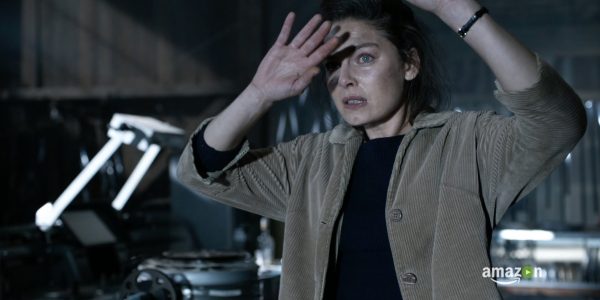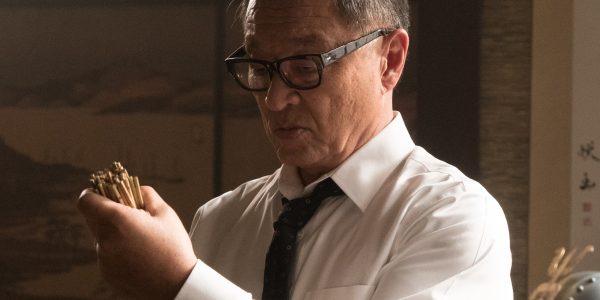The Man in the High Castle Season Two (Spoiler Free) Review
"Season two is off to a much stronger start than season one"
After three years producing original content, Amazon is finally starting to emerge from Netflix's shadow as a source of great television content. While the streaming site has had a critical hit with the much lauded
Transparent, the network's other shows haven't had the flash that Netflix seems to get out of nearly every one of their shows. But this year, Amazon released several qaulity series, including
One Mississippi, Fleabag, the second season of
Catastrophe, and now, the second season of
The Man in the High Castle, which will be released Friday, December 16.
I wasn't a huge fan of the first season of the series. While the concept was (and remains) particularly intriguing, I found the show's central characters to be bland and without any real redeeming qualities. It's incredibly hard to root for characters to succeed when you don't understand what is driving them to make the consistently poor and uninformed choices they are making. And simply classifying it as "because of family" isn't nearly enough- particularly in the first season of a series, when a show should be taking great pains to show its audience what drives its characters.
However, despite the disappointing first season, I decided to jump back into the complex and beautifully drawn world of the series for another round. And, while there are still some issues apparent in the shows first five episodes (which were made available to critics in advance), a number of the hang-ups I had with season one have been ironed out for the show's second season.

The biggest positive change can be found in the show's cast. While season one standouts Rufus Sewell as SS
Obergruppenführer John Smith and Cary-Hiroyuki Tagawa as Nobusuke Tagomi (who can imbue more emotion into a wistful glance than most actors can with a Shakespearean monologue) remain the highlights of the second season, the show's other three leads- Alexa Davalos as Juliana Crain, Rupert Evans as Frank Frink, and Luke Kleintank as Joe Blake- have found their footing in their respective roles.
It certainly helps that this season is less focused on the inner-workings of the Resistance and the quest to save the different films from the Man in the High Castle, and more focused on building the various characters and setting up larger arcs to impact a wider swath of characters. While the five central characters are each given their own individual story beats, each character plays a role in the larger season arc: whether or not the rising tensions between Japan and the Reich will lead to a cataclysmic event that could destroy both world powers.

And that bigger picture focus makes each moment within the first five episodes crackle with a greater layer of suspense. The strongest element of
The Man in the High Castle will always be the show's initial hook: What could have happened if the Axis Powers won World War II? Playing into that arc helps to better develop the central characters in a way that never happened last year. We learn more about why Joe was recruited by the Nazis (and it's a lovely twist). Seeing Juliana and Frank both take steps to embrace their individual journeys goes a long way to fixing all that was wrong with both characters in season one. Apart, each character (and actor) has a chance to shine in a way they couldn't when they were tied so closely together. And having John Smith's son's illness throw the stalwart supporter of the Reich into turmoil makes for some of the best drama the show has to offer.
I will note that, in light of the current political climate, the imagery of the series seemed to resonate more with me this year than last. It's even more chilling to watch a classroom of children offer up a Nazi salute, and to hear particularly odious and disgusting Nazi beliefs spoken about on the series, after having seen similar actions and statements throughout this year. While
The Man in the High Castle remains a sci-fi look at an alternate future, the series is, perhaps, even more complex and relevant in the changing (and troubling) world of today than Philip K. Dick could have predicted when he wrote his novella back in 1962. Either way, the second season has righted the ship, so to speak, from the uneven offering of season one. If, like me, you were wary of giving the show another chance, give it a go. There's a lot to sink your teeth into this time around.
 The biggest positive change can be found in the show's cast. While season one standouts Rufus Sewell as SS Obergruppenführer John Smith and Cary-Hiroyuki Tagawa as Nobusuke Tagomi (who can imbue more emotion into a wistful glance than most actors can with a Shakespearean monologue) remain the highlights of the second season, the show's other three leads- Alexa Davalos as Juliana Crain, Rupert Evans as Frank Frink, and Luke Kleintank as Joe Blake- have found their footing in their respective roles.
It certainly helps that this season is less focused on the inner-workings of the Resistance and the quest to save the different films from the Man in the High Castle, and more focused on building the various characters and setting up larger arcs to impact a wider swath of characters. While the five central characters are each given their own individual story beats, each character plays a role in the larger season arc: whether or not the rising tensions between Japan and the Reich will lead to a cataclysmic event that could destroy both world powers.
The biggest positive change can be found in the show's cast. While season one standouts Rufus Sewell as SS Obergruppenführer John Smith and Cary-Hiroyuki Tagawa as Nobusuke Tagomi (who can imbue more emotion into a wistful glance than most actors can with a Shakespearean monologue) remain the highlights of the second season, the show's other three leads- Alexa Davalos as Juliana Crain, Rupert Evans as Frank Frink, and Luke Kleintank as Joe Blake- have found their footing in their respective roles.
It certainly helps that this season is less focused on the inner-workings of the Resistance and the quest to save the different films from the Man in the High Castle, and more focused on building the various characters and setting up larger arcs to impact a wider swath of characters. While the five central characters are each given their own individual story beats, each character plays a role in the larger season arc: whether or not the rising tensions between Japan and the Reich will lead to a cataclysmic event that could destroy both world powers.
 And that bigger picture focus makes each moment within the first five episodes crackle with a greater layer of suspense. The strongest element of The Man in the High Castle will always be the show's initial hook: What could have happened if the Axis Powers won World War II? Playing into that arc helps to better develop the central characters in a way that never happened last year. We learn more about why Joe was recruited by the Nazis (and it's a lovely twist). Seeing Juliana and Frank both take steps to embrace their individual journeys goes a long way to fixing all that was wrong with both characters in season one. Apart, each character (and actor) has a chance to shine in a way they couldn't when they were tied so closely together. And having John Smith's son's illness throw the stalwart supporter of the Reich into turmoil makes for some of the best drama the show has to offer.
I will note that, in light of the current political climate, the imagery of the series seemed to resonate more with me this year than last. It's even more chilling to watch a classroom of children offer up a Nazi salute, and to hear particularly odious and disgusting Nazi beliefs spoken about on the series, after having seen similar actions and statements throughout this year. While The Man in the High Castle remains a sci-fi look at an alternate future, the series is, perhaps, even more complex and relevant in the changing (and troubling) world of today than Philip K. Dick could have predicted when he wrote his novella back in 1962. Either way, the second season has righted the ship, so to speak, from the uneven offering of season one. If, like me, you were wary of giving the show another chance, give it a go. There's a lot to sink your teeth into this time around.
And that bigger picture focus makes each moment within the first five episodes crackle with a greater layer of suspense. The strongest element of The Man in the High Castle will always be the show's initial hook: What could have happened if the Axis Powers won World War II? Playing into that arc helps to better develop the central characters in a way that never happened last year. We learn more about why Joe was recruited by the Nazis (and it's a lovely twist). Seeing Juliana and Frank both take steps to embrace their individual journeys goes a long way to fixing all that was wrong with both characters in season one. Apart, each character (and actor) has a chance to shine in a way they couldn't when they were tied so closely together. And having John Smith's son's illness throw the stalwart supporter of the Reich into turmoil makes for some of the best drama the show has to offer.
I will note that, in light of the current political climate, the imagery of the series seemed to resonate more with me this year than last. It's even more chilling to watch a classroom of children offer up a Nazi salute, and to hear particularly odious and disgusting Nazi beliefs spoken about on the series, after having seen similar actions and statements throughout this year. While The Man in the High Castle remains a sci-fi look at an alternate future, the series is, perhaps, even more complex and relevant in the changing (and troubling) world of today than Philip K. Dick could have predicted when he wrote his novella back in 1962. Either way, the second season has righted the ship, so to speak, from the uneven offering of season one. If, like me, you were wary of giving the show another chance, give it a go. There's a lot to sink your teeth into this time around.